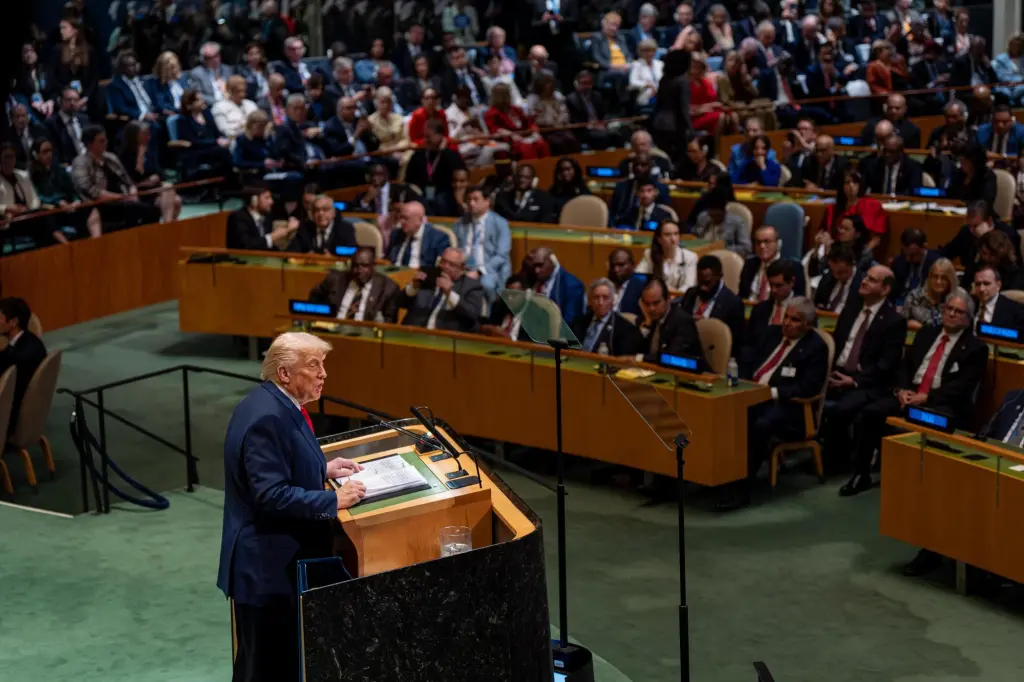
In his Sept. 23 speech at the U.N. General Assembly, Donald Trump revisited a critical question: “What is the purpose of the United Nations?” By casting doubt on whether the U.N. should exist, his address makes us grapple with a broader issue: How is multilateralism repurposing?
The term “multilateralism” is traditional shorthand for coordinated action by states that transcends national borders. It is predicated on the belief that a collective approach to globe-spanning challenges like climate change, pandemics and AI is required.
Trump’s unbecoming remarks at the U.N. — the pinnacle of a system of international institutions, alliances and treaties — are emblematic of a crisis of multilateralism.
Picking up on his barbed message, it behooves us to consider: Is the U.N. fulfilling its noble purposes, principally maintenance of international peace and security and respect for human rights? Clearly, no. Have major powers dimmed the U.N.’s role in world affairs? Yes. Does the multilateral system need to be reimagined? Yes.
The Trump Administration’s underlying hypocrisy is revealed in its policy on multilateralism. While handicapping the U.N., Trump and his loyalists lambaste it for its lack of effectiveness.
True, the U.N. is shot through with problems of its own making. From my perch working at U.N. specialized agencies and participating in its diplomat training programs, I had an up-close view of flaws in this convoluted bureaucracy.
Compounding the world body’s other problems, U.S. financial support for the U.N. is waning. With the world’s largest economy, the U.S. contributes 22% of the U.N. regular budget of $3.5 billion — slightly greater than China’s 20%. Even though the U.S. contribution is down from 40% since 1945, the Trump Administration has announced that it will slash considerably more.
To lend perspective, the U.S. assessment is less than New York City’s police department annual budget of $5.8 billion and about 10% of our military spending on conflicts in the Middle East since the Oct. 7, 2023, attacks.
On Trump’s watch, Washington has withdrawn from landmark treaties like the Paris Climate Agreement. It is departing from U.N.-affiliated agencies, including the Human Rights Council, the WHO and UNESCO.
In his hate-filled talk at the 2025 General Assembly, Trump berated world leaders, telling them: “Your countries are going to hell.” He described London’s Sadiq Khan as “a terrible mayor” who wants to impose Shariah law.
Trump also called climate change the “greatest con job” perpetrated on the world. He maintained that all the U.N. does is write “strongly worded letters” and speak in “empty words.”
In the ambit of foreign policy, Trumpism is a reaction to the demise of Pax Americana. It marks an inflection point in multilateralism.
In these changing times, the U.N. embodies traditional multilateralism. Comprised of member states, it is based on the principle of sovereign equality. But sovereignty is increasingly challenged by transnational corporations, advanced technologies and nongovernmental organizations, such as networks of criminals.
The problem with the old multilateralism is that it is too top-down, barely reaching civil society: a host of voluntary organizations, including religious groups, small businesses and local charities. Limited enforcement power is a formidable difficulty.
In this milieu, Trumpists are enabling anti-multilateralism. While paying lip service to the old multilateralism — at a post-speech meeting, Trump said, “Our country is behind the United Nations 100 percent” — they favor muscular nationalism. Meanwhile, unilateralism is on the rise.
The Trump Administration is nostalgic for a Monroe Doctrine, sphere-of-influence policy, allowing big powers to dominate their respective world regions. However, it is not clear where the boundaries between these spheres lie, who draws them and how conflicts are to be resolved.
There is another option, namely, democratic multilateralism. The impetus would be bottom-up; the economy, geared to a trickle-up strategy. Pressure from civil society and social movements (e.g., environmentalists, human rights advocates and women’s groups) could broaden political participation. This multilateralism would be multilevel, with states constituting but one layer in a plural order.
Is this wishful thinking? The growing disillusionment with multilateral institutions constitutes not only a crisis but also an opportunity. I remain hopeful because of rising resistance to the policies of would-be hegemons and the commitment of legions of young people striving for a more humane future.
Jim Mittelman, a Boulder resident and Camera columnist, is an educator, activist and author. His books include “The Globalization Syndrome,” “Implausible Dream: The World-Class University and Repurposing Higher Education,” and “Runaway Capitalism,” which is due out in November.